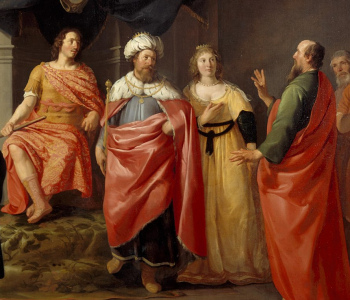Herod and Bernice
It happened about this time in Paul's stay in Caesara that Herod Agrippa II., King of Chalcis, with his sister Bernice, came on a complimentary visit to the new governor, and stayed some days at Caesarea. This prince had been familiarly acquainted from his youth with all that related to the Jewish law, and moreover was at this time superintendent of the Temple, with the power of appointing the high priest.
Festus took advantage of this opportunity of consulting one better informed than himself on the points in question. He recounted to King Agrippa what has been summarily related above, confessing his ignorance of Jewish theology, and alluding especially to Paul's reiterated assertion concerning "one Jesus who had died and was alive again."
This cannot have been the first time that Agrippa had heard of the resurrection of Jesus or of the Apostle Paul. His curiosity was aroused, and he expressed a wish to see the prisoner. Festus readily acceded to the request, and fixed the next day for the interview.

The King Appears
At the time appointed, King Agrippa and Bernice came with great pomp and display. They entered into the audience chamber, with a suite of military officers and the chief men of Caesarea; and at the command of Festus, Paul was brought before them.
The proceedings were opened by a ceremonious speech from Festus himself, describing the circumstances under which the prisoner had been brought under his notice, and ending with a statement of his perplexity as to what he should write to "his Lord" the Emperor. This being concluded, Agrippa said condescendingly to Apostle Paul, that he was now permitted to speak for himself (Acts 26:1).
After Paul's speech which preached the gospel and spoke of the resurrection, Festus broke out into a loud exclamation, expressive of ridicule and surprise. To the cold man of the world, as to the inquisitive Athenians, the doctrine of the resurrection was foolishness: and he said, "Paul, thou art mad: thy incessant study is turning thee to madness." (Acts 26:24).
The Apostle had alluded in his speech to writings which had a mysterious sound, to the prophets and to Moses (Acts 26:22 - 23), and it is reasonable to believe that in his imprisonment, such "books and parchments," as he afterwards wrote for in his second letter to Timothy, were brought to him by his friends.
Festus adopted the conclusion that he had before him a mad enthusiast, whose head had been turned by poring over strange learning. The Apostle's reply was courteous and self-possessed, but intensely earnest.
But he said, "I am not mad, most noble Festus, but I utter true and rational words. For the king, to whom I speak with boldness, is informed of these things. For I am convinced that none of these things are hidden from him; for this has not been done in a corner" (Acts 26:25 - 26, HBFV).
Then, turning to the Jewish voluptuary who sat beside the Governor, Paul made a solemn appeal to him.
"King Agrippa, do you believe the prophets? I know that you believe" (Acts 26:27, HBFV).
The King's reply was, "Thou wilt soon persuade me to be a Christian" (Acts 26:28). The words were doubtless spoken ironically and in contempt: but Paul took them as though they had been spoken in earnest, and made that noble answer, which expresses, as no other words ever expressed them, that union of enthusiastic zeal with genuine courtesy, which is the true characteristic of a Christian.
And Paul said, "I wish to God that in both a little time and in much, not only you, but also all those who are listening to me this day, would become such as I am, except for these bonds." (Acts 26:29, HBFV).
This concluded the interview. King Agrippa had no desire to hear more; and he rose from his seat, with the Governor and Bernice and those who sat with them. As they retired, they discussed the case with one another, and agreed that Paul was guilty of nothing worthy of death or even imprisonment.
Agrippa the king said positively to Festus, "This man might have been set at liberty, if he had not appealed to the Emperor" (Acts 26:32). But the appeal had been made. There was no retreat either for Festus or for the Apostle Paul. On the new Governor's part there was no wish to continue the procrastination of Felix and nothing now remained but to wait for a convenient opportunity of sending his prisoner to Rome.